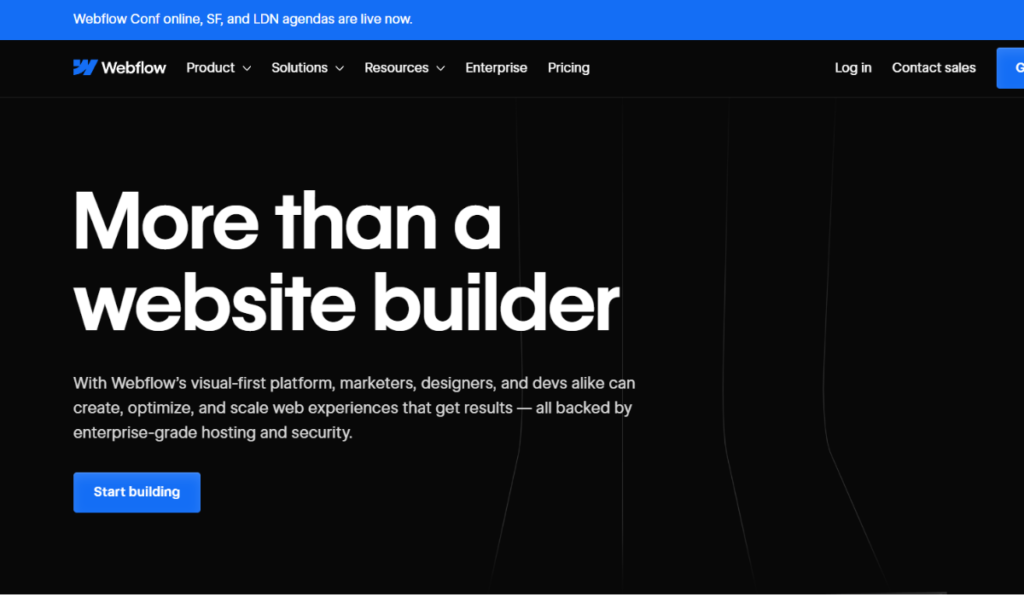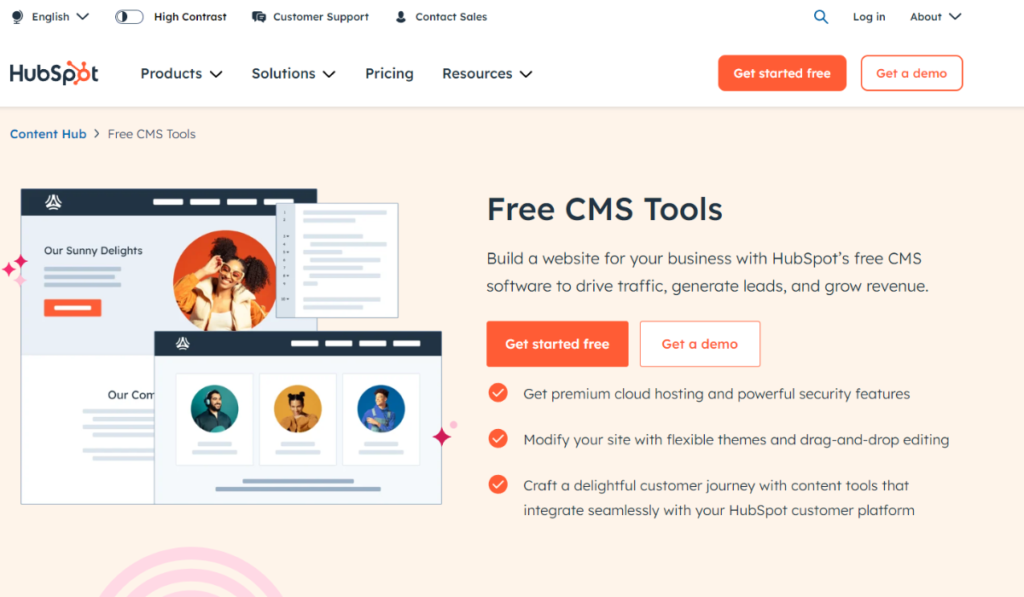Choosing the proper Content Management System is one of the most important decisions made during the website development process. Firstly, a CMS is necessary for content management; it will provide better search engine optimization to your website. In simple terms, people are wondering, “Which CMS is best for SEO?” To assist you choose the perfect CMS platform for your website, this article reviews the leading CMS platforms with a special focus on their SEO features.
What is an SEO-Friendly CMS?
An SEO-friendly CMS will support and provide features that will help improve your SEO. Key characteristics of an SEO-friendly CMS include:
- Customizable URLs: Allowing clean, descriptive, keyword-rich URLs is very important so that search engines easily understand what your pages’ contents are.
- Responsive Design: The site will adapt to different screen sizes and devices, which will make it friendlier for users and the search engines.
- Metadata Control: Easily operate meta title, description, and tags for better on-page SEO and making your content look luring in search appearances.
- Performance Optimization: It shall have features that enhance website speed and loading time, including but not limited to caching mechanisms, code optimization, to ensure good SEO performance.
- SEO Tools and Plugins: It includes built tools or integrations of popular SEO plugins to ease keyword optimization, site analysis, and tracking performance.
Does a CMS matter for SEO?
Yes, a CMS matters in terms of SEO. The kind of platform used may create a huge difference in the way a website can perform to rank well in search engines. A good CMS with more robust features in terms of SEO will facilitate doing best practices, such as optimizing meta tags, creating clean URLs, and ensuring your website is mobile-friendly. Additionally, various CMS systems have their own SEO tools or are integrated with SEO plugins, which might provide an easy way to optimize your website for better visibility.
Also Read:
What are the Benefits of Using a CMS for SEO?
Here are a few benefits of using a CMS for SEO:
- Ease of Optimization: CMS makes it pretty easy to implement SEO best practices. You can easily edit meta tags, optimize images, and keywordize your content without requiring in-depth technical knowledge.
- Structured Content: Most CMS’s have structured content management out of the box, allowing one to organize and present content in search engine-friendly ways. Most features include categories, tags, and taxonomies.
- Scalability: Because your website may be growing, a CMS will be able to grow with your site by possibly adding more content and meeting search engine optimization needs. There are so many offer scalable solutions that support ever-growing SEO strategies.
- Integration with SEO Tools: Many of these systems allow integrations of popular SEO tools and plugins. These tools help provide insight into the performance of your SEO and help track keywords and analyze site metrics.
- Responsive Design: This design works effectively on several devices and different screen sizes, and most modern CMS platforms have support for responsive design to ensure good SEO.
10 Best CMS Platforms for SEO in 2024
When it comes to selecting a CMS with SEO in mind, one wants to be careful and find the best platform for his or her exact needs and SEO goals. Of all these websites, each has strengths and flaws. Some have advantages that will influence how well one can optimize his site. Here’s an in-depth look into ten of the top CMS platforms for SEO in 2024:
WordPress

Image Source: WordPress
- Overview: WordPress is the most widely used Content Management System around the world. And its advantages are manifold: it is flexible and has a very wide variety of plugins.
- SEO Strengths: WordPress, when it comes to SEO, is without competition because its strong SEO plugins like Yoast SEO and All in One SEO, among others, help in providing a full suite of tools for the optimization of content. This system supports customizable URLs, responsive themes, and runs on robust community support. Because of how flexible WordPress is, going into advanced configurations for further SEO customization makes it ideal for users that need the best performance in search engines.
Joomla

Image Source: Joomla
- Overview: Joomla is a powerful CMS for the most complex of websites and applications. Most of the focus goes into customization and scalability.
- SEO Strengths: Joomla enables a wide range of SEO-enhancing extensions, such as Easy Frontend SEO (EFSEO), which makes certain quite sophisticated SEO management pretty easy. It also supports editable meta tags and clean URLs, both of which are great for search engine rankings. Rich site architecture and the extent of content organization in Joomla further helps in building the SEO momentum, thus becoming one of the most viable options for an advanced SEO approach.
Shopify

Image Source: Shopify
- Overview: Shopify represents a Content Management System that is pushed to extremes, targeting e-commerce websites; it covers all major features that a web store could need.
- SEO Strengths: Shopify provides all the basic features of SEO optimization, such as providing meta tags and alt tags for your images, while this helps rank in SERPs to some extent. Moreover, Shopify is optimized for speed—one of the most important aspects of a good user experience and an SEO-friendly website. Third-party apps and other tools within Shopify further develop its basic inner functionality into being solid at the core level regarding e-commerce SEO.
Drupal

Image Source: Drupal
- Overview: Drupal is a powerful CMS, well-known for flexibility and large, complicated sites.
- SEO Strengths: Advanced functionality of SEO in Drupal is enabled with the help of modules such as Pathauto for URL customization and Metatag for metadata managing. It also supports XML sitemaps and other SEO tools that help in the improvement of site structure and better indexing by search engines. The flexibility of Drupal itself and full control over site content and structure is an added advantage for comprehensive SEO optimization.
Wix

Image Source: Wix
- Overview: Wix is an easy-to-use CMS designed largely for small business and personal uses of web sites. Thus the major importance to the company is its ease of use and flexibility in design.
- SEO Strengths: Wix assists in SEO; SEO Wiz provides a guided tour for users on their optimization journey, which later makes it favorable for persons with fewer SEO backgrounds. Customizable URL’s mobile optimization feature. Improved Wix SEO mechanisms. However, it could remain less flexible with the most advanced website builders, including WordPress.
Squarespace

Image Source: Squarespace
- Overview: Squarespace is an aesthetically oriented platform with great-looking templates and ease of use, targeting that part of users that appreciate aesthetics above all.
- SEO Strengths: Squarespace is a platform with inbuilt SEO features, which include editable meta tags, mobile-friendly designs, and clean URL structures. It’s instinctive to use and has really beautiful templates, which is why so many users consider it a more alluring choice for users who have simpler needs when it comes to managing SEO. At the same time, though, it may not be as strong in terms of deep SEO customization when compared with other platforms.
Magento

Image Source: Magento
- Overview: Magento is one of the strongest e-commerce Content Management Systems, since it’s scalable.
- SEO Strengths: Magento offers all SEO functions, such as meta tags editable by the user, URL rewrites, complete performance analysis, and many others. Thus, The platform’s flexibility means even minute details become SEO-optimized on a large-scale e-commerce store that requires serious optimization to improve their visibility in search engines.
Webflow

Image Source: Webflow
- Overview: A design-oriented CMS with advanced features.
- SEO Strengths: Strong functionality with SEO, via customization of meta tags and clean URLs, responsive design, and more. The design-centric approach that Webflow follows lets users go in deep when it comes to on-page SEO elements. Advanced functionality, such as dynamic content management and detailed SEO audits, gives users greater control over their SEO strategy.
HubSpot CMS Hub

Image Source: HubSpot
- Overview: HubSpot CMS is a fully integrated marketing and sales CMS.
- SEO Strengths: Highly effective SEO features are provided, ranging from system-wide optimization recommendations to content planning and analytics. Furthermore, HubSpot CMS Hub is more focused on aligning sales and marketing, which enhances the entire SEO output. Then it is best suited for companies that are inbound marketing-focused. It offers a wide range of capabilities, such as content strategy recommendations, automated recommendations for SEO adjustments, and more thorough performance monitoring.
Weebly

Image Source: Weebly
- Overview: Weebly is a lightweight CMS, with its main focus pointed at small businesses and personal sites, which puts ease of setup and use in the foreground.
- SEO Strengths: Weebly offers a few SEO features out of the box. You can change meta tags, and its responsive design by default means your site can appear in search results using Weebly. Since it’s aimed at ease of use, though, Weebly won’t have everything an advanced user might want or need from more feature-rich platforms.
Due to their distinct features and characteristics, each CMS is well-suited for a range of SEO requirements. As a result, by being aware of these choices, you will be able to select the CMS that most closely matches the objectives and SEO tactics of your website.
Conclusion
Your choice in CMS has a crucial impact on the success of your site, with the help of SEO. Be it WordPress, Joomla, Drupal, Shopify, or any other CMS, each has some pros and cons linked to it. So, The key lies in choosing a CMS that will fit your SEO objectives, technical capabilities, and the particular needs of your website. You can enhance the SEO performance of your site, make it rank well in search engines, and thus generate more traffic to it by using an appropriate CMS.
FAQs
Does the choice of CMS affect SEO?
Yes, the CMS used will affect SEO. A good SEO-friendly CMS or a set of plugins would help one optimize even further and bring good rankings in search engines.
What features make a CMS SEO-friendly?
An SEO-friendly CMS would contain customizable URLs, responsive design, easily manageable meta tags, and also performance optimization tools.
How do SEO-friendly CMS platforms benefit my website?
They make it easier to optimize since they have built-in tools that could help one manage SEO elements, ensure your website is mobile-friendly, and boost its performance.
Which CMS is best for SEO in 2024?
For SEO, it is highly recommended to use WordPress because of its extended plugins and customizeability. Other powerful abilities in SEO stand out on the following platforms: Drupal, Joomla, and Magento.

